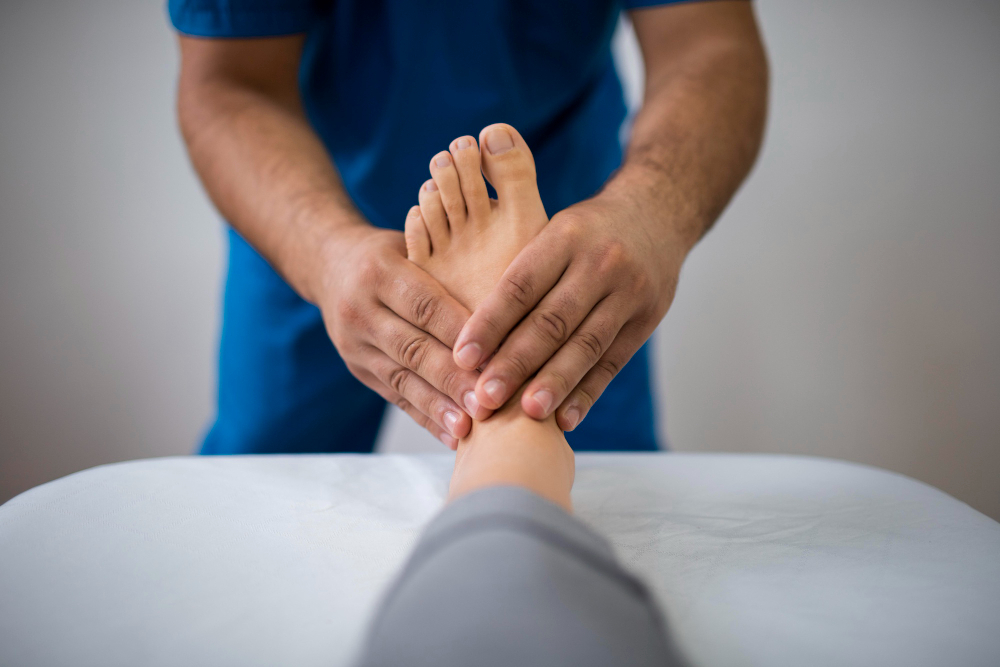
Neuropathy, also known as peripheral neuropathy, refers to damage or dysfunction of one or more peripheral nerves, which can cause pain, weakness, numbness, and tingling, usually in the hands and feet. The peripheral nervous system includes all the nerves outside the brain and spinal cord. Neuropathy can result from various causes and affect different types of nerves.
Types of Neuropathy
- Peripheral Neuropathy: Affects nerves outside the brain and spinal cord.
- Autonomic Neuropathy: Affects the autonomic nerves, which control internal organs and regulate functions like blood pressure, digestion, and heart rate.
- Proximal Neuropathy: Affects the nerves closer to the body’s center, such as the thighs, hips, or buttocks.
- Focal Neuropathy: Affects a single nerve or a small group of nerves, usually causing weakness or pain.
Symptoms
The symptoms of neuropathy depend on the type of nerves affected:
- Sensory nerves:
- Numbness or reduced ability to feel pain or temperature changes.
- Tingling, burning, or stabbing pains.
- Sensitivity to touch.
- Pain during activities that shouldn’t cause pain, such as pain in the feet when putting weight on them or when they’re under a blanket.
- Motor nerves:
- Muscle weakness.
- Paralysis.
- Lack of coordination and falling.
- Autonomic nerves:
- Heat intolerance and altered sweating.
- Bowel, bladder, or digestive problems.
- Changes in blood pressure, causing dizziness or lightheadedness.
Causes
Neuropathy can be caused by a variety of factors, including:
- Diabetes: The most common cause of neuropathy, particularly in the United States.
- Infections: Such as Lyme disease, shingles (varicella-zoster), Epstein-Barr virus, hepatitis C, leprosy, diphtheria, and HIV.
- Autoimmune diseases: Including lupus, rheumatoid arthritis, and Guillain-Barre syndrome.
- Trauma or pressure on the nerve: From injuries, repetitive stress, or conditions like carpal tunnel syndrome.
- Vitamin deficiencies: Particularly B vitamins.
- Alcoholism: Can lead to nutritional deficiencies that affect nerve function.
- Exposure to toxins: Including heavy metals, chemotherapy drugs, and some industrial chemicals.
- Inherited disorders: Such as Charcot-Marie-Tooth disease.
- Medications: Certain medications, especially those used to treat cancer (chemotherapy).
- Kidney, liver, or thyroid disorders: These conditions can affect nerve health.
Diagnosis
Diagnosing neuropathy involves several steps:
- Medical history and physical exam: Understanding symptoms and any underlying conditions.
- Neurological examination: Testing reflexes, muscle strength, and sensory function.
- Blood tests: To detect underlying conditions such as diabetes, vitamin deficiencies, or thyroid problems.
- Imaging tests: MRI or CT scans to look for causes like herniated discs or tumors.
- Nerve function tests:
- Electromyography (EMG): Measures electrical activity in muscles.
- Nerve conduction studies (NCS): Measures the speed and strength of signals traveling in the nerves.
- Nerve biopsy: A small section of nerve is removed and examined under a microscope.
Treatment
Treatment focuses on managing the underlying cause and relieving symptoms:
- Medications:
- Pain relievers:
- Anti-seizure medications:
- Antidepressants
- Topical treatments:
- Physical therapy: To improve muscle strength and coordination.
- Occupational therapy: To help with daily activities.
- Lifestyle changes: Regular exercise, a healthy diet, quitting smoking, and limiting alcohol intake.
- Managing underlying conditions: Controlling blood sugar levels in diabetes, correcting vitamin deficiencies, or treating autoimmune diseases.
- Surgery: For cases caused by nerve compression, such as carpal tunnel syndrome.
Management and Support
Living with neuropathy requires ongoing management:
- Foot care: Especially important for people with diabetes to prevent infections.
- Pain management: Regularly taking prescribed medications and using complementary therapies like acupuncture or biofeedback.
- Support groups: Joining groups for people with neuropathy can provide emotional support and practical advice.
If you suspect you have neuropathy or are experiencing symptoms, it is important to consult a healthcare provider for a thorough evaluation and appropriate treatment plan.


